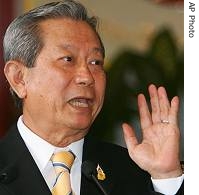-
(单词翻译:双击或拖选)
By Roger Wilkison
Bangkok
22 November 2006
Thailand's interim1 prime minister says shadowy Muslim militants2 in his country's three southernmost provinces are raising money through a network of Thai restaurants in neighboring Malaysia. Malaysia is denying the charge.
 |
| Surayud Chulanont |
Mr. Surayud says their main source of funding is a chain of Thai restaurants in Malaysia known as the Tom Yum Kung network, named for a spicy3 Thai shrimp4 soup. He says the restaurants donate money to the militants, but that other funds come from the extortion of local businessmen in the deep south of Thailand itself.
An official of the Malaysian embassy in Bangkok, who asked not to be identified, said Mr. Surayud's claim was baseless. The diplomat5 said Malaysia would like Thailand to prove the prime minister's allegations.
The perpetrators of bombings, beheadings and drive-by shootings in the South have so far not made any demands or identified their aims. Nevertheless, they are thought to be campaigning for the largely Muslim southern provinces to be separated from Thailand, and rejoined with neighboring Malaysia, or reconstituted as an independent sultanate. The region was annexed6 by Thailand a century ago.
Mr. Surayud has made ending the violence a priority. He has apologized for the hard-line tactics used in the largely Malay-speaking region by his elected predecessor7, Thaksin Shinawatra, who was overthrown8 by the Thai military in September, and says he is willing to talk to the militants.
But, so far, their only response has been to step up the wave of violence.
Thai officials say one of the problems in dealing9 with the insurgents10, most of whom are believed to be youths attached to village-based networks, is that the government has been unable to identify leaders with the authority to negotiate on the militants' behalf.
In the past, the government has dealt with separatist leaders who are now based in Malaysia, but they do not appear to be involved in the current insurgency11.
Wan12 Kadir Che Wan, one of those exiled leaders, heads a rebel group called Bersatu. He told the Al-Jazeera television network that the younger militants are unwilling13 to negotiate with the Thai government, and believe they have the upper hand in their struggle for an independent Muslim state.
He also said that Jemaah Islamiyah, the Southeast Asian terrorist network affiliated14 with Al-Qaida, may have infiltrated15 southern Thailand.
Mr. Surayud, however, says that so far, support for the militants from foreign Islamic radicals16 has been minimal17.
 收听单词发音
收听单词发音
1
interim

|
|
| adj.暂时的,临时的;n.间歇,过渡期间 | |
参考例句: |
|
|
|
2
militants

|
|
| 激进分子,好斗分子( militant的名词复数 ) | |
参考例句: |
|
|
|
3
spicy

|
|
| adj.加香料的;辛辣的,有风味的 | |
参考例句: |
|
|
|
4
shrimp

|
|
| n.虾,小虾;矮小的人 | |
参考例句: |
|
|
|
5
diplomat

|
|
| n.外交官,外交家;能交际的人,圆滑的人 | |
参考例句: |
|
|
|
6
annexed

|
|
| [法] 附加的,附属的 | |
参考例句: |
|
|
|
7
predecessor

|
|
| n.前辈,前任 | |
参考例句: |
|
|
|
8
overthrown

|
|
| adj. 打翻的,推倒的,倾覆的 动词overthrow的过去分词 | |
参考例句: |
|
|
|
9
dealing

|
|
| n.经商方法,待人态度 | |
参考例句: |
|
|
|
10
insurgents

|
|
| n.起义,暴动,造反( insurgent的名词复数 ) | |
参考例句: |
|
|
|
11
insurgency

|
|
| n.起义;暴动;叛变 | |
参考例句: |
|
|
|
12
wan

|
|
| (wide area network)广域网 | |
参考例句: |
|
|
|
13
unwilling

|
|
| adj.不情愿的 | |
参考例句: |
|
|
|
14
affiliated

|
|
| adj. 附属的, 有关连的 | |
参考例句: |
|
|
|
15
infiltrated

|
|
| adj.[医]浸润的v.(使)渗透,(指思想)渗入人的心中( infiltrate的过去式和过去分词 ) | |
参考例句: |
|
|
|
16
radicals

|
|
| n.激进分子( radical的名词复数 );根基;基本原理;[数学]根数 | |
参考例句: |
|
|
|
17
minimal

|
|
| adj.尽可能少的,最小的 | |
参考例句: |
|
|
|















